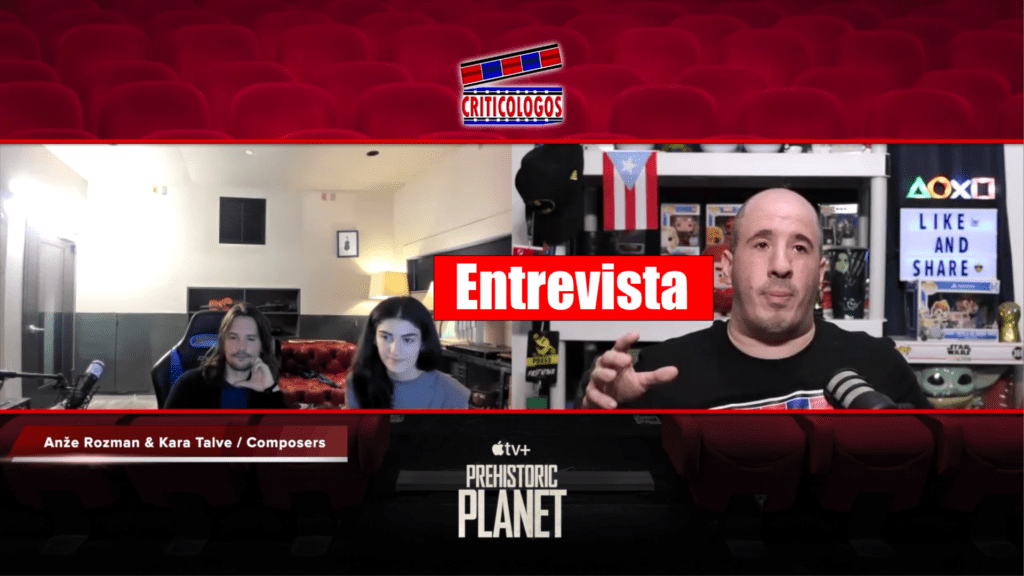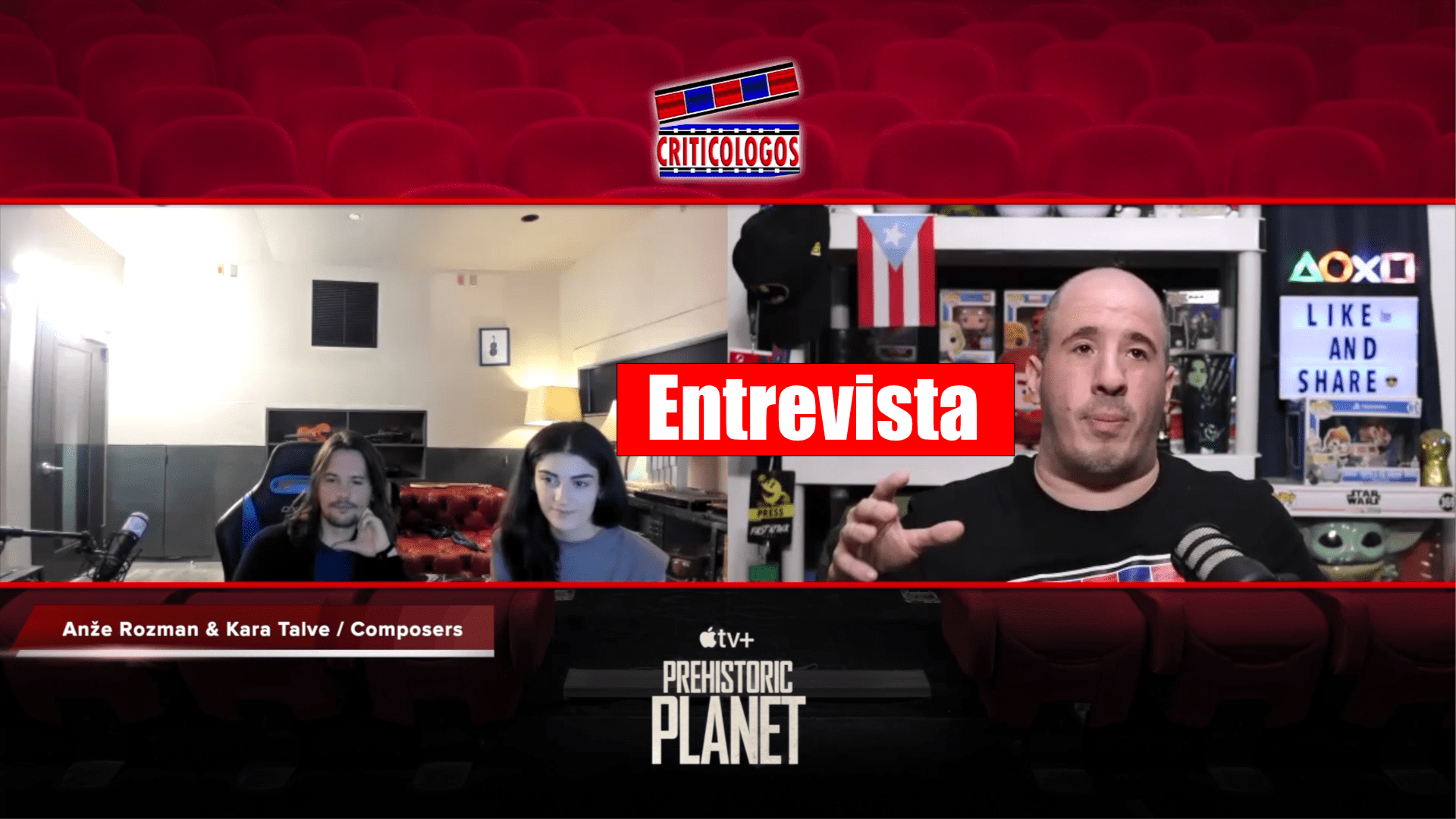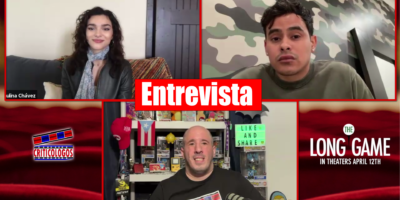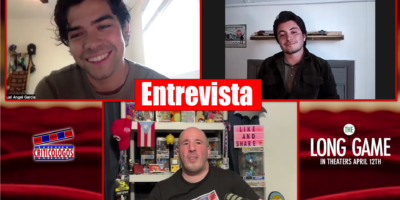
Interview w/ Apple TV+ Prehistoric Planet composers Anže Rozman & Kara Talve as we talk about this “otherworldly” score, & working with Hans Zimmer. Now available on Apple TV+. #PrehistoricPlanet @karatalve @ARozmanComposer @BFCustomMusic @AppleTVPlus @Rmediavilla
Experience the wonders of our world like never before in this epic docuseries from Jon Favreau and the producers of “Planet Earth.” “Prehistoric Planet” combines award-winning wildlife filmmaking, the latest paleontology learnings and state-of-the-art technology to unveil the spectacular habitats and inhabitants of ancient Earth for a one-of-a-kind immersive experience. The series is produced by the world-renowned team at BBC Studios Natural History Unit with support from the photorealistic visual effects of MPC (“The Lion King,” “The Jungle Book”) applied to concept art created by Jellyfish Pictures (“The Book of Boba Fett,” “Spirit: Untamed”). “Prehistoric Planet” presents little-known and surprising facts of dinosaur life set against the backdrop of the environments of Cretaceous times, including coasts, deserts, freshwater, ice worlds and forests. Travel back 66 million years to when majestic dinosaurs and extraordinary creatures roamed the lands, seas and skies.
Criticólogos:
I think my first question before diving into what you guys did with the score is now that the series is out, you got a chance to see it completely, what were your expectations from it until you finally saw it?
Anže Rozman:
The week that it came out, we every evening we would watch the episodes as they would come out and you know working on the show for. We worked on it for almost two years, I guess a little less so. Then finally being able to see it all rendered with the final mixes of our music. Sir David Attenborough was the voice that was very humbling and inspiring, you know, like we’ve always been fans of Sir David watching called the Planet Earth Series. And then hearing his voice over our music was incredible. Yeah.
Kara Talve:
Like Anže was saying, working on it for two years, you don’t really get the full picture because a lot of times the artists weren’t done and the CGI wasn’t obviously fully rendered. So we kind of had to use our imagination a little bit throughout the process. And then seeing it on the big screen and what they came up with is really remarkable.
Criticólogos:
How much did you knew of the project when coming into how it was going to be presented?
Anže Rozman:
We had spotting sessions with the directors and the showrunner Tim Walker for each specific episode. Sometimes we would even like, you know, talk with the multiple times and the first versions of the episodes that we would get. They would already have some animatics and storyboards and, you know, maybe just a little box with a like mock animation. But the main thing is that the story arc never changed throughout the episodes.
It was so important for us to really listen to the directors and listening to what they wanted. The story of, you know, the Roma Azores and the hadrosaur as an ice swirls, like how the story goes. So when we did the first version of our music, even though that after that they redid some animations and recut the sequence and we had to record the music to the new picture. The story arc never changed. So yeah, the spawning sessions were key here.
Criticólogos:
Are you excited by the concept of dinosaurs, of the idea of dinosaurs? And how excited are you guys coming into the fire thinking of the magnitude of technology behind it?
Kara Talve:
Yeah, well, there’s a lot of things to be excited about. First and foremost, Bleeding Fingers has a relationship with the BBC and they’ve been working together on many of these nature documentaries for years now. And that’s something that I’m saying I always wanted to do was work with the BBC and on one of these awesome nature shows, and then on top of it you find out that it’s about dinosaurs, which is a topic that everyone loves and is interested in. And then we’re like double excited for that fact. So yeah, it’s really a dream come true.
Anže Rozman:
Yeah. And I was always I’ve always been a dinosaur nerd and fan. I have a little scar here on my eye. You probably can see it on the camera. The scar. It’s from 1994, I think, when Jurassic Park came out, if I. If I remember correctly. And I was in preschool, and all of me and my friends were all, you know. Flipping out because of drastic barks. We played dinosaurs and I was always designated to be the velociraptor hunting my friends down. One time, like my, my friend was. I was chasing him and I ran into a fence. So I still hold the scar from my velociraptor days. Yeah. I’ve always been a dinosaur fan, so, like, doing this is crazy. It’s absolutely crazy.
Criticólogos:
Let’s talk about the music. Who do you work for directly? How do we start scoring a series like this one?
Kara Talve:
Well, it does start with the spotting session. So that’s when we get on Zoom for this instance with Tim Walker, the series producer, and all the directors, because there’s one or maybe two directors sometimes per episode, usually one in this case, and they are the ones that have the initial vision of what they’re looking for in that sequence. We would go through every episode, each sequence, and maybe we’d talk about what the temp track is doing right or what it’s doing incorrectly and which direction they want to take it from there.
And you know, we really focus on the storyline so we don’t talk so much in musical terms, but a lot and emotions and story and that’s how, how the idea is initially born. And then we’d go back and forth with Hans and Russell, and that’s how the ideas really come to life.
Anže Rozman:
We try not to talk music with the director. You talk emotions and talk of story. And our job as composers is to translate that into music and enhance it because, you know, the scenes could turn out completely differently. I don’t know. The T-Rex and Turtle seem like there’s a T-Rex killing a turtle. Basically, the music is comedic because you want it to be cute, but like, who would have put sinister music? Like, it would be a completely different story there, you know.
Criticólogos:
Who do you go for Inspiration? When you have a specific scene and you’re being told to do this, how do you get yourself in the zone? And who do you channel in order to get that specific tone or the specific sound they want to go for?
Anže Rozman:
I mean, inspiration. It’s a weird word, and we perceive it differently as composers through time. So, you know, we write music every day, and what we get inspired by is what’s on our screen. So here we got inspired by the stories when we write. For me personally, I think for Kara, it’s the same when we when we are in the writing. Like weeks, we tend not to listen to music. Like the only music we would really hear is the temp track. And we like to listen to it once and then never again. It has to come from like an inner part of you and your ability to express to express the emotions you wanted to express in your technical ability.
And it has to come in with the within without. External factors interfering too much. And of course, you know, it’s we go through lives, there’s we listen to music. We we have our favorite composers, favorite films. All of that combined is kind of in our head all the time, whether we like it or not.
Kara Talve:
But I think specifically for this score, we really wanted to have a unique and otherworldly sound. So that’s where the instruments that we built came into play because that’s a big part of our inspiration for the score, was making our own sounds and utilizing them.
Anže Rozman:
We can say is kind of the moment where we really realized, oh, we have something special is we took a trip to Arizona to and visited some dinosaur related sites like the meteor crater and the footprint site. I forgot what it’s called right now. And the Petrified Forest National Park. And in Sedona, we stumbled upon a Native American trading post. And it was basically we found a room that was meant for arts and crafts. And it has just. It has just. Tons of bones and fossils and rocks and Native American instruments. And then we saw all of that and we were like, Oh, instruments, bones, fossils. That’s what we can study from dinosaurs. Why don’t we take these materials and try to create unique instruments? So that’s how that’s when we kind of knew, Oh, maybe we have something really special that we can work with.
Criticólogos:
I wanted to ask about your instrument because I mean this to we feel something that is pretty important now. Composers, you know, building their own things in order to create that sound. It was all you guys do or was there anything synthezing going on or any anything samples that you or at least taken in order to create something? Or was it all organic?
Kara Talve:
It was a big combo of all that stuff. We recorded an 80 piece orchestra, the National BBC Orchestra of Wales, but that combined with our instruments that we built and we have some stuff that we’re samples, but most of it got replaced in the end. Aside from any custom built libraries that we made and we also recorded some amazing instrumentalists from around the world. One that comes to mind is Garth comes in, he’s a musician in Turkey and he’s built the Yamaha and that instrument is layered with the orchestra very frequently throughout the score.
Anže Rozman:
And so the orchestra is always like creates the atmosphere. Everyone is used to the orchestra. It’s kind of it’s hard to even portray some sort of emotions without the orchestra. So that’s kind of like the atmosphere and then the instruments that we created. That is what transports the listener back in time. It creates the otherworldly feeling or portray certain characters. Yeah. So that that combined this then the sound that we have.
Criticólogos:
If we compared past projects that you have worked. What did you took from the other to this one, or what are the challenges that you just saw with this one?
Anže Rozman:
I worked as an additional writer on Seven Worlds One Planet was Jacob Shay, and that was a huge learning curve for me in scoring natural history. And before that, I scored a few other natural history shows, but, you know, never, never show on this magnitude. It’s a big learning curve to reach. Like kind of the efficiency of scoring that is required to score these shows because it’s a lot of music. It has a lot of layers. You have to have the ability to shift from one emotion to another. Emotion from one instrumentation to another. Instrumentation very fast and make it seem seamless and smooth. It’s like one coherent piece of music. And the other task we had that we enjoyed tremendously is collaborating with each other and with Hans.
For like the coasts episode, the hatchlings, the Combs versus fossil Drake scene, if you remember where they try to reach the forest and it’s a ten minute sequence, and we were passing those 10 minutes between each other. I think it’s five shifts where I did a section, carried a section, and then I would play on Kara section. Kara would work on my section. And when you listen back to the 10 minutes, it seems like one person created it and you can’t really realize who did what you know on.
I went a bit off the loop here on this question, but yeah, it’s I would say that out of any genre of of scoring for media. And I might get grief for that from my colleagues, but I think natural history scoring is probably the toughest.
Kara Talve:
I would definitely agree with that. It’s very it’s a daunting task because you’re dealing with, you know, characters that aren’t speaking. And you have to portray certain emotions based on, you know, what the directors are telling you and what the narration is saying while trying not to interfere with, you know, important sound effects and sound design.
It’s really this marriage of those things to, you know, tell the story the way that the directors envisioned it. And I think that’s the biggest challenge. But also the biggest reward at the end is seeing the whole thing come together.
Anže Rozman:
Yeah, and only one more thing, if I can add also. Music plays such a huge role in natural history documentaries. It’s almost like people expect the score to be good in in maybe some TV series or films. The music is really backing and it’s just enhancing the emotion here. You kind of have to enhance it and also be able to sing while doing it. In certain moments. You can sing more, certain moments you can sing less. But music is like it takes almost not a lead role. The character’s always the lead role. But if David Foster David is not speaking, the music is the one telling the story.
Kara Talve:
People are reading reviews and they’re talking about, oh, they’re so cute. Like, they’re such like dear characters on the show. And I think the music, aside from them being amazingly rendered and just adorable, I think the music helps them feel that way or another.
Anže Rozman:
Another scene that came to mind and I hope I can pronounce the dinosaur’s name correctly because I can. I can never do it. Uh, Dino Kyra’s the the platypus looking character. And he’s just scratching himself. And the music is, like, kind of epic. And we did like, this epic blues with our custom cellos and stuff. And imagine looking at that scene without all the music, it would. It would be him just scratching at a tree.
Kara Talve:
But the music is the thing that’s going to make you feel. Oh, he’s so funny and adorable know.
Criticólogos:
Let’s talk about your experience working with Hans Zimmer?
Kara Talve:
Well, yeah, we’re both huge fans of Hans, obviously, and it’s been an honor to be able to collaborate with, you know, one of the world’s greatest composers.
Anže Rozman:
It’s always like such a collaborative environment that Hans and Ross created here at Bleeding Fingers music, you know? Yeah. And the same goes for this project. After like all the sporting sessions, we would meet with the person, Hans Russell Simmons and Russell Emanuel, our score producer and CEO, Leading Fingers and, you know, brainstorm ideas, watch the sequences together before. So before even we would write a note, you know, there would be always some brainstorming and inputs from Hans and Russ and he’s just such a great storyteller. He’s been his career is so vast. And just sometimes just some little inputs help. So much like, I don’t know. I can’t. He would just say something very small and it would change the whole scene, you know? Yeah. So, yeah, it’s very humbling, you know, to create the score with complete legends Sir David Attenborough, Jon Favreau, Hans Zimmer. And we we’re here at the beginning of our career really well.
See the interview below:




